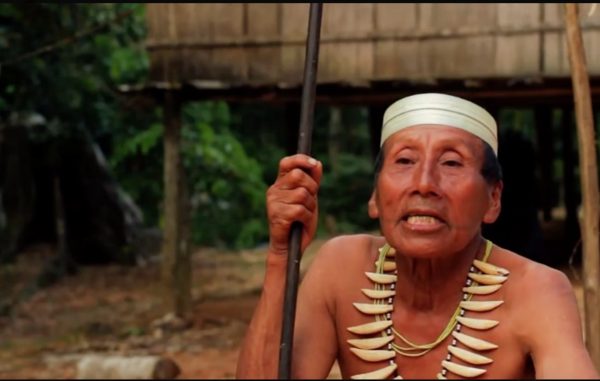
by Deep Green Resistance News Service | Mar 15, 2017 | Indigenous Autonomy, Lobbying
Featured image: Salomon Dunu, a Matsés man who survived the trauma of first contact, speaks to a Survival campaigner about the threat of oil exploration to his people. © Survival International
by Survival International
A Canadian oil company has told Survival International it will withdraw from the territory of several uncontacted tribes in the Amazon where it had been intending to explore for oil.
The company, Pacific E&P, had previously been awarded the right to explore for oil in a large area of the Amazon Uncontacted Frontier, a region of immense biodiversity which is home to more uncontacted tribes than anywhere else on Earth. It began its first phase of oil exploration in 2012.
The move follows years of campaigning by Survival International and several Peruvian indigenous organizations, including AIDESEP, ORPIO, and ORAU. ORPIO is suing the government over the threat of oil exploration.
Thousands of Survival supporters had protested by sending emails to the company’s CEO, lobbying the Peruvian government, and contacting the company through social media.
Survival also released an open letter, protesting against the threat of oil exploration, which was signed by Rainforest Foundation Norway and ORPIO. Sustained campaigning helped bring attention to the issue within Peru and around the world.
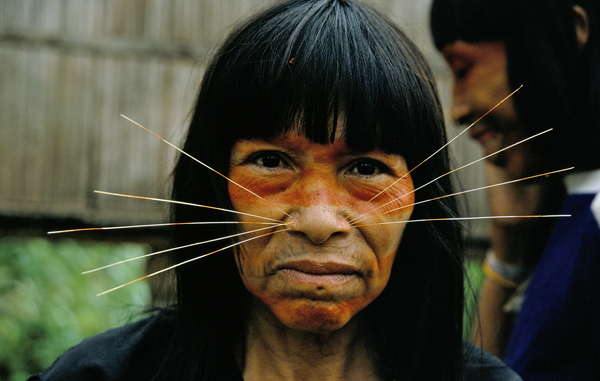
The Matsés have been dependent on and managed a large area of the Amazon Uncontacted Frontier for generations. © Christopher Pillitz
In a letter, Pacific E&P’s Institutional Relations and Sustainability Manager said that: “[The company] has made the decision to relinquish its exploration rights in Block 135… effective immediately… We wish to reiterate the company’s commitment to conduct its operations under the highest sustainability and human rights guidelines.”
At a tribal meeting in late 2016, a man from the Matsés tribe, which was forced into contact in the late 20th century, said: “I don’t want my children to be destroyed by oil and war. That’s why we’re defending ourselves… and why we Matsés have come together. The oil companies … are insulting us and we won’t stay silent as they exploit us on our homeland. If it’s necessary, we’ll die in the war against oil.”
Oil exploration involves sustained land invasion which can dramatically increase the risk of forced contact with uncontacted tribes. It leaves them vulnerable to violence from outsiders who steal their land and resources, and to diseases like flu and measles to which they have no resistance.
The announcement that it was not going ahead was welcomed by campaigners as significant in the fight to protect uncontacted peoples’ lives, lands and human rights.
Survival’s Director Stephen Corry said: “This is great news for the global campaign for uncontacted tribes and all those who wish to halt the genocide that has swept across the Americas since the arrival of Columbus. All uncontacted peoples face catastrophe unless their land is protected and we believe they are a vitally important part of humankind’s diversity and deserve their right to life to be upheld. We will continue to lead the fight to let them live.”
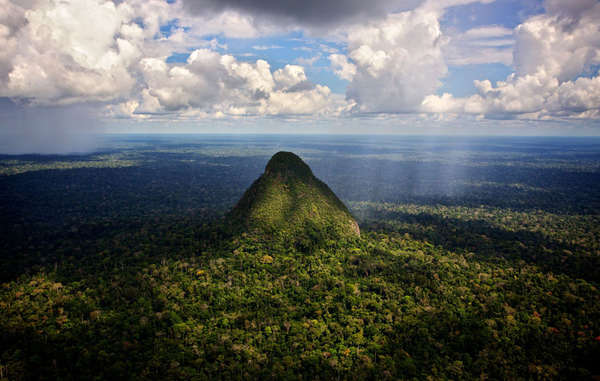
The region includes the Sierra del Divisor, or “Watershed Mountains,” a unique and highly biodiverse region known for its cone-shaped peaks. © Diego Perez
Background briefing
▪ Oil block 135 is within the proposed Yavarí Tapiche indigenous reserve. Peru’s national Indian organization AIDESEP has been calling for the creation of the reserve for over 14 years.
▪ Part of the oil concession is within the newly created Sierra del Divisor national park. The Peruvian government had awarded Pacific E&P rights to explore within the park.
▪ The Yavarí Tapiche region is part of the Amazon Uncontacted Frontier. This area straddles the borders of Peru and Brazil and is home to more uncontacted tribes than anywhere else in the world.
▪ Peru has ratified ILO 169, the international law for tribal peoples, which requires it to protect tribal land rights.
▪ We know very little about the uncontacted tribes in the area. Some are presumed to be Matsés, but there are other uncontacted nomadic peoples in the region.
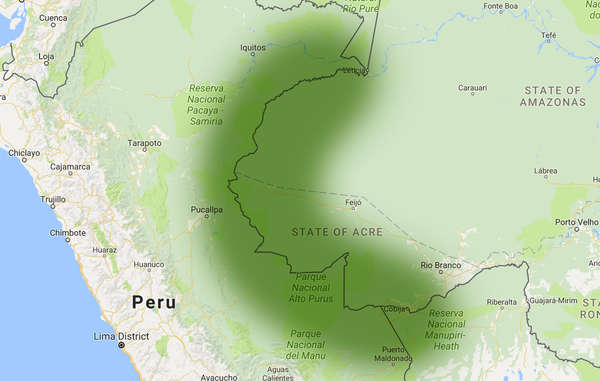
The Amazon Uncontacted Frontier, a large area on the Peru-Brazil border that is home to the highest concentration of uncontacted tribes in the world. © Survival International
Uncontacted tribes are not backward and primitive relics of a remote past. They are our contemporaries and a vitally important part of humankind’s diversity. Where their rights are respected, they continue to thrive.
Their knowledge is irreplaceable and has been developed over thousands of years. They are the best guardians of their environment. And evidence proves that tribal territories are the best barrier to deforestation.
All uncontacted tribal peoples face catastrophe unless their land is protected. Survival International is leading the global fight to secure their land for them, and to give them the chance to determine their own futures.
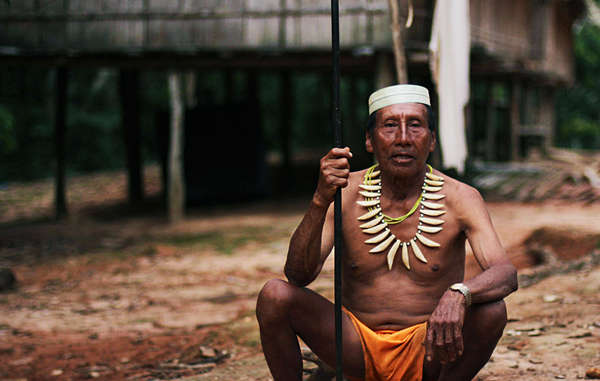
by Deep Green Resistance News Service | Mar 10, 2017 | Lobbying
Featured image: The Matsés have denounced oil exploration in the proposed Yavarí Tapiche reserve, which is part of their ancestral lands. © Survival International
by Survival International
In an open letter to the Peruvian authorities, Survival International, Rainforest Foundation Norway and Peruvian indigenous organization ORPIO have denounced the Peruvian government’s failure to protect uncontacted tribes.
The organizations are calling for the government to create an indigenous reserve, known as Yavari-Tapiche, for uncontacted tribes along the Peru-Brazil border, and to put a stop to outsiders entering the territory.
In the letter the three organizations state: “Uncontacted tribes are the most vulnerable peoples on the planet. They have made the decision to be isolated and this must be respected…
“The Yavarí Tapiche region is home to uncontacted peoples. Despite knowing of their existence and enormous vulnerability, the government has failed to guarantee their protection…
“These tribal peoples face catastrophe unless their land is protected. Only by creating the proposed Yavarí Tapiche indigenous reserve and implementing effective protection mechanisms that prevent the entry of outsiders, will the indigenous people be given the chance to determine their own futures…
“We are also concerned about the government’s refusal to exclude oil exploration within the proposed reserve…. No exploration or exploitation of oil should ever be carried out on territories inhabited by uncontacted Indians…
“We believe that the oil company Pacific Stratus is poised to begin operations this year in areas where there are uncontacted tribes…
“By failing to both create the reserve and to rule out oil exploration, Peru is violating both domestic and international law…
“If the government does not act urgently to protect the uncontacted peoples of Yavarí Tapiche, we fear that they will not survive. Another tribe will disappear from the face of the earth, before the eyes of the world.”
Survival’s Director Stephen Corry said: “We’ve repeatedly called for the Yavarí-Tapiche indigenous reserve to be created and for oil exploration to be ruled out, but the government has dragged its feet. The lives of uncontacted Indians are on the line but once again, economic interests take priority.”
Background Briefing
– The Yavarí Tapiche region is part of the Amazon Uncontacted Frontier. This area straddles the borders of Peru and Brazil and is home to more uncontacted tribes than anywhere else in the world.
– Pacific Stratus, part of Canadian oil company Pacific E&P, began its first phase of oil exploration in 2012, despite protests from indigenous organizations and Survival International. It is believed that the company will begin its second phase soon.
– Oil exploration is devastating for uncontacted tribes. Over 50% of the Nahua tribe died as a result of exploration in the 80s.
– The indigenous organization ORPIO is suing the government over the threat of oil exploration.
– National indigenous organization AIDESEP has been calling for the creation of the reserve for over 14 years.
by Deep Green Resistance News Service | Dec 24, 2016 | Colonialism & Conquest
Featured image: Rosa Andrade was the last female speaker of the Resígaro language. © Alberto Chirif
by Survival International
The last female speaker of the Resígaro language has been murdered in Peru. Her body was found decapitated at her home in the Amazon rainforest.
Rosa Andrade, 67, lived with the Ocaina tribe. Her father was Ocaina and her mother Resígaro.
The Ocaina and Resígaro tribes were victims of the rubber boom, which began at the end of the nineteenth century. Tens of thousands of Indians were enslaved by rubber barons intent on extracting rubber in the Amazon. Many indigenous people died from sheer exhaustion, or were killed by violence and diseases like flu and measles to which they had no immunity.
The Resígaro tribe was eventually wiped out, and Rosa and her brother became the last remaining speakers of the language.
Rosa was also one of the last speakers of Ocaina and was regarded as a pillar of her community. She knew a wide repertoire of songs and stories in both languages and had recently been designated, by the government, to teach children Ocaina
Five thousand of the world’s six thousand languages are indigenous, and it is estimated that an indigenous language dies once every two weeks.
There are over a hundred uncontacted tribes worldwide, and their languages are the most endangered. Survival International is campaigning for the lands of uncontacted tribes to be protected, for where their rights are respected, they continue to thrive.
Rosa’s community suspects that an outsider, known for violent behavior, is responsible for the murder. However, the local prosecutor has declared that there is insufficient evidence to prosecute. The community is calling for a serious investigation to take place to find the culprit.
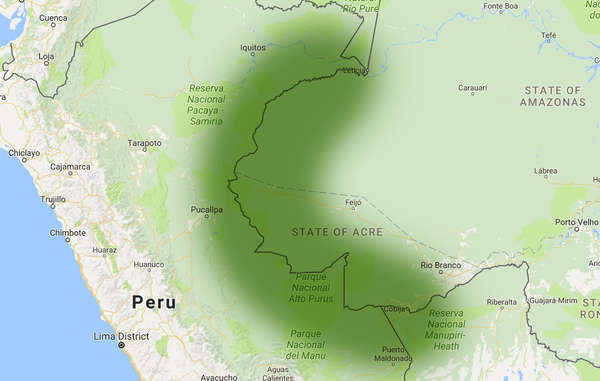
by Deep Green Resistance News Service | Dec 1, 2016 | Colonialism & Conquest
Featured image: The Amazon Uncontacted Frontier, a large area on the Peru-Brazil border that is home to the largest concentration of uncontacted tribes in the world. © Survival International
By Survival International
A new “death road” advocated by a notorious Italian priest is set to cut in two the land of several uncontacted tribes in the heartland of the Amazon Uncontacted Frontier.
The road is expected to be approved by Peru’s congress soon, and will run through 270 km of the Amazon’s most biodiverse and sensitive protected areas.
The project has been supported for years by Father Miguel Piovesan, a Catholic priest who has described the local tribal peoples as “prehistoric,” and slammed international NGOs for raising concerns about the plan.
The road was rejected by Peru’s Congress in 2012. Despite this, work continued illegally for many years, and now the project has been proposed again by Congressman Carlos Tubino.
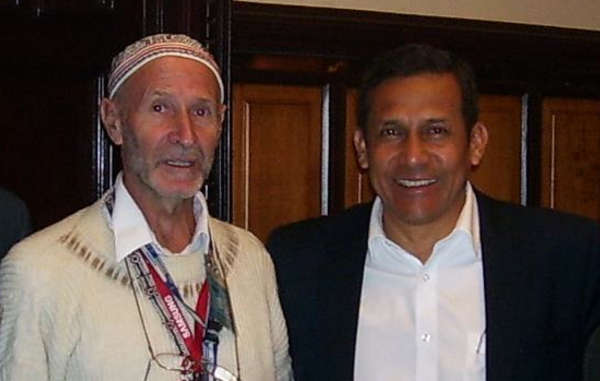
Fr. Miguel Piovesan, the main backer of the Purus road, alongside former President Ollanta Humala.
© Anon
Uncontacted tribes are the most vulnerable peoples on the planet. There are estimated to be around 15 uncontacted peoples in Peru, many of them in the region where the road will be built.
Survival International has lodged a complaint with the United Nations, citing the catastrophic impact on the uncontacted Indians and urging the Peruvian government to veto the plan.
Of the 3-4,000 people in the area, around 80% are indigenous. Most of them are opposed to the road.
Emilio Montes, president of the indigenous organization FECONAPU, which is based in Puerto Esperanza said: “We flatly reject this road. We indigenous people won’t benefit from it, only the loggers, miners, oil companies and narcotraffickers. It threatens the lives of our isolated relatives, like the Mashco Piro. It will destroy our animals and plants. They should, instead, respect our ancestral territories. We’ve always lived here, and our children must carry on doing so. We need another type of development which looks after our resources sustainably: so that we can live properly, and secure our future.”
Survival’s Director Stephen Corry said: “If this road goes ahead, it will destroy the uncontacted tribes, and their “development” will be terminated for ever. Survival has fought roads in this part of Amazonia for decades. Who are they supposed to help? If Peru has any respect for fundamental human rights and the rule of law, it must stop these plans now.”
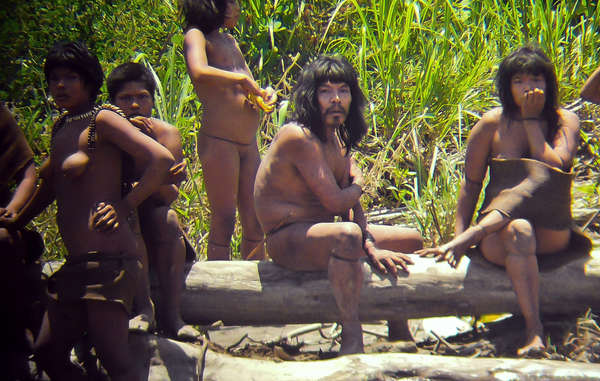
Uncontacted Mashco-Piro Indians on a riverbank near the Manú National Park. 2011.
© Jean-Paul Van Belle
Background
- The road will connect Puerto Esperanza to the Inter-Oceanic Highway, which runs through Peru and Brazil. The area is part of the Amazon Uncontacted Frontier, the region along the Peru-Brazil border with the highest concentration of uncontacted tribes in the world.
- Uncontacted peoples who could be wiped out if the road is built include the Mashco Piro, Chitonahua, Mastanahua and Sapanawa, who have all lived nomadically in the region for generations. Outsiders such as missionaries and loggers have forced several groups to make contact in recent years.
- Elsewhere in the Amazon, road “development” projects have allowed an influx of colonists to access remote areas and threaten the lives and lands of uncontacted peoples.
- Several indigenous organizations in Peru have made a statement rejecting the road.
- Fr. Piovesan has repeatedly denied the existence of uncontacted peoples. His parish newsletter stated that: “Isolation is not a natural wish. We can’t prove that isolated people exist. They are dreamt up by those who barely know indigenous people, or base their investigations on unproven theories.”
- Uncontacted Indians have clearly expressed their desire to remain uncontacted. The project cannot be carried out with their consent and will violate their right to determine their own futures.
We know very little about uncontacted tribes. But we do know there are more than a hundred around the world. And we know whole populations are being wiped out by genocidal violence from outsiders who steal their land and resources, and by diseases like flu and measles to which they have no resistance.
Uncontacted tribes are not backward and primitive relics of a remote past. They are our contemporaries and a vitally important part of humankind’s diversity. Where their rights are respected, they continue to thrive.
All uncontacted tribal peoples face catastrophe unless their land is protected. Survival International are doing everything we can to secure their land for them, and to give them the chance to determine their own futures.
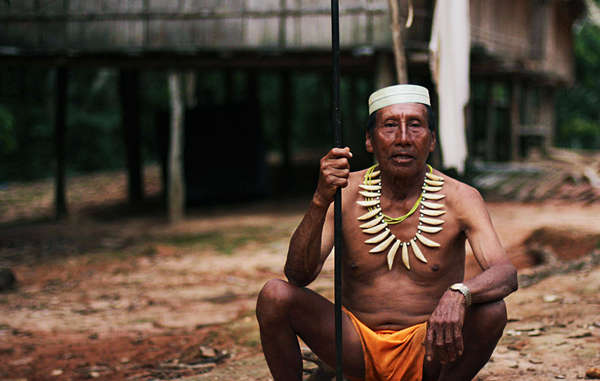
by Deep Green Resistance News Service | Oct 6, 2016 | Mining & Drilling
Featured image: Many contacted Matsés have expressed opposition to any efforts to contact their uncontacted neighbors, or to explore for oil in their territory. © Survival International
by Survival International
Survival International has learned that the Peruvian government is developing a “Master Plan” for a new national park that could pave the way for large-scale oil exploration. This will threaten the lives and lands of several uncontacted tribes.
The area, known in Spanish as the Sierra del Divisor [“Watershed Mountains”], is part of the Amazon Uncontacted Frontier, the region straddling the Peru-Brazil border that is home to the largest concentration of uncontacted tribal peoples on the planet.
A new plan for the area currently being drafted by Peru’s national parks agency SERNANP could enable oil companies to enter the park. It has further been reported that the new government wants to change the law to make it even easier to open up national parks to oil and gas operations.
The Sierra del Divisor National Park was created in 2015 to protect the region. The new plan could wipe out the uncontacted Indians, not all of whom have been recognized by the authorities.
A contacted Matsés woman said: “Oil will destroy the place where our rivers are born. What will happen to the fish? What will the animals drink?”
In 2016, Canadian oil company Pacific E&P cancelled a contract to explore for oil on nearby contacted Matsés territory, in the face of stiff opposition from the tribe.

The Watershed Mountains are a unique and highly diverse environment, home to many uncontacted tribal peoples.
© Diego Perez
However, it still has a contract to explore in the Watershed Mountains.
In 2012, it conducted the first phase of exploration, which Survival International and contacted Matsés campaigned against.
The more vulnerable uncontacted members of the tribe are still at risk, and not in a position to consent or object to the project. The environment that they have depended on and managed for millennia could be destroyed.
The oil exploration process uses thousands of underground explosions along hundreds of tracks cut into the forest to determine the location of oil deposits.
Uncontacted tribes are the most vulnerable peoples on the planet. All uncontacted tribal peoples face catastrophe unless their land is protected.
With a new Peruvian government in place, Survival and the indigenous organizations AIDESEP, ORPIO and ORAU are urging the government to think again.
Survival’s Director Stephen Corry said: “It’s in all our interests to fight for the land rights of uncontacted tribes, because evidence proves that tribal territories are the best barrier to deforestation. Survival is doing everything we can to secure their land for them.”










